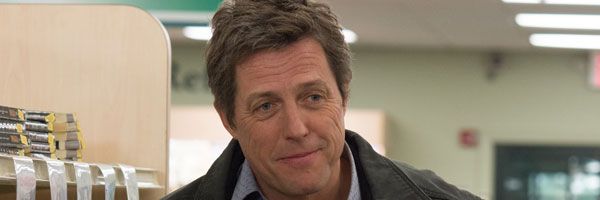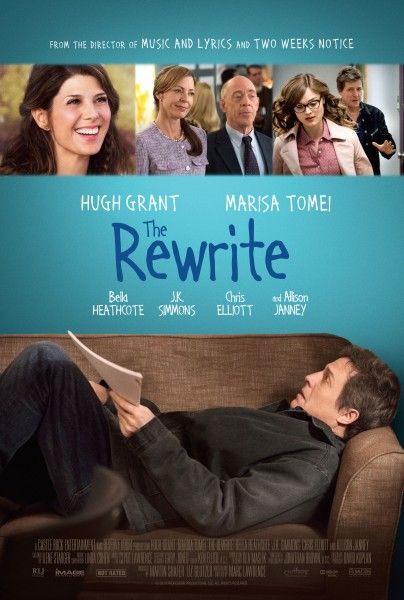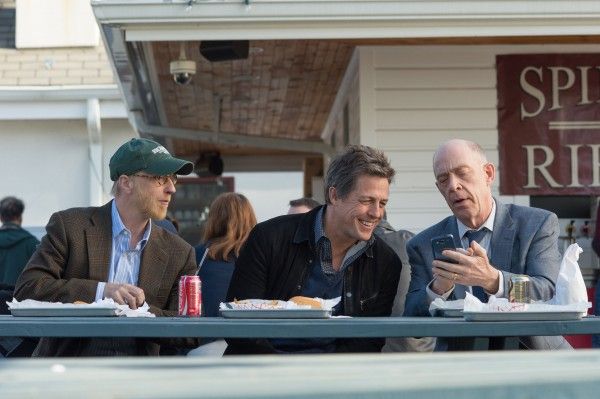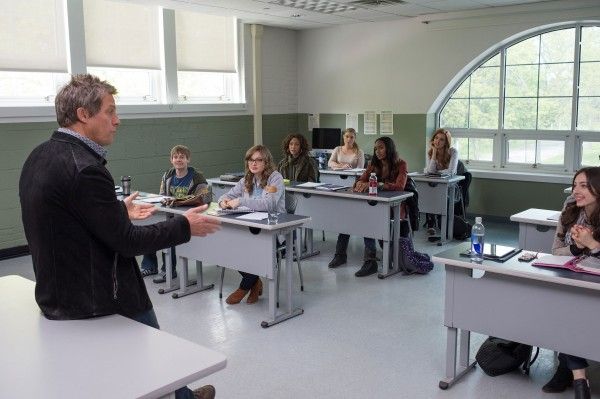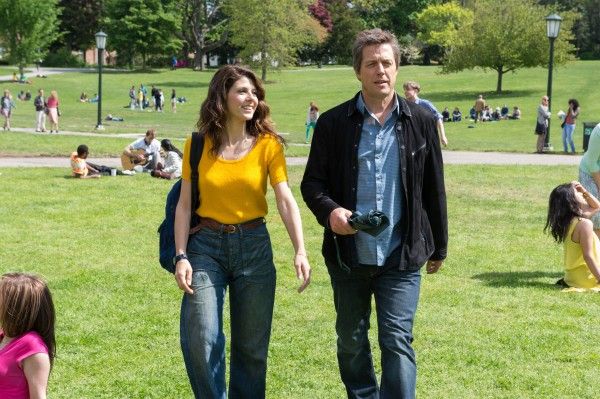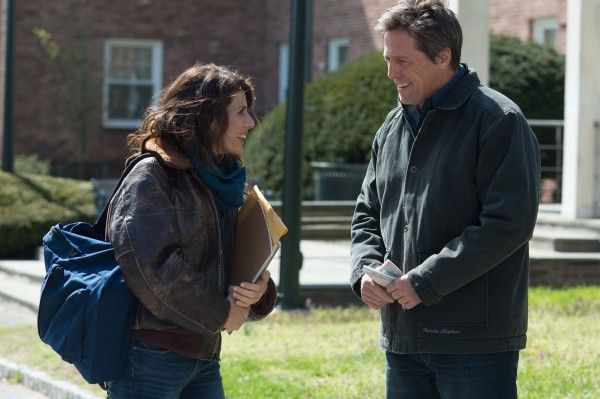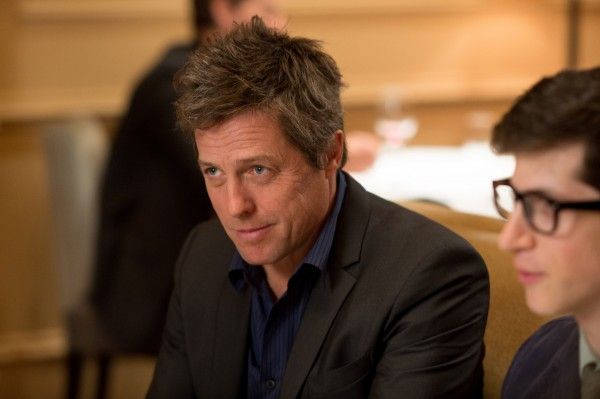Hugh Grant and Marc Lawrence are at it again. After Two Weeks Notice, Music and Lyrics and Did You Hear About the Morgans, they’re on to their fourth film together, The Rewrite. This time around Grant stars as Keith Michaels, a screenwriter who scored an Academy Award for a film called Paradise Lost, but now can’t land a job. To keep him afloat financially, his agent sets him up with a teaching gig at Binghamton University. He goes into it planning to “do as little as possible while carrying on this charade,” but then he starts to realize that his lessons are actually helping his students and finds himself becoming more invested in their screenplays.
With The Rewrite hitting theaters and VOD on February 13th, Grant took the time to sit down and talk about his experience making the movie. He discussed his collaboration with Lawrence, his personal prep process, the real studio head who inspired J.K. Simmons’ character, the top-notch diners on Long Island, the use of earpieces within the acting community, The Man from U.N.C.L.E., preparing to work with Meryl Streep on Florence Foster Jenkins and more. You can check it all out in the interview below.
Question: Can you tell me about re-teaming with Marc for this? Is there anything about the material that made you think it could take your collaboration to a new level?
HUGH GRANT: Yeah, because I thought, okay, there’s a little bit of a romantic comedy in here, but it’s not the main thrust. And I liked the story of a guy who’s lost and in despair, and finds a whole new avenue opening up for him. I thought that was interesting.
Clearly lots of people enjoy the movies you two make together, so do you ever feel pressure to keep delivering what’s worked in the past?
GRANT: No, I think the film does give them some romantic comedy and, you know, Marisa [Tomei] is brilliant in the film, but as I said, I think it’s more interesting than just a straight up romantic comedy.
Did Marc have any good failed pitch stories to share to help you get into character?
GRANT: He and I probably have tons of stories of bad moments, as well as good moments. He and I have been lucky on the whole in Hollywood. We’ve been very lucky and we’ve done alright. We’ve not got to Keith’s position yet.
Do you have any stories from some of those tougher moments that might be inspiring to aspiring writes that have hit tough times?
GRANT: I like the story of Matt Damon and Ben Affleck when they wrote Good Will Hunting and they started to believe that the company that had the script, owned their script, weren’t really reading the new drafts as they came in. They’d give notes, but they didn’t think they were reading them, so they inserted into one of their drafts a moment where the two main characters have sex with each other, just to see if anyone would pick it up, and the studio didn’t.
Is that where the idea for that part in this movie came from?
GRANT: Maybe it does, yeah. Maybe. The bit about the J.K. Simmons character crying when he talks about his children is also from Hollywood, actually. It was a very important studio head who I knew quite well. Lovely man, but I used to have bets with people when we had dinner with him that I could make him cry with certain conversational triggers.
I read in the notes that you worked on some of the drafts of the script with Marc. Can you tell me about that collaboration?
GRANT: We’ve done that on all our films. I’m just quite interfering. I like to have a say, and then, you know, he makes a very good pretense of valuing my opinion. He’s also obsessed with re-writing. He can’t sit still, even with a whole section that’s brilliant. You find he’s rewritten it and you say, ‘Why’d you do that?’ So he’s a sort of compulsive rewriter.
Did that ever happen on this one? Did he re-write anything that you asked to bring back?
GRANT: I can’t remember because it was some time ago, but that definitely is a pattern with him, yeah.
Did working on the script with him make for a natural segue into this role?
GRANT: No. I’m quite interested, I suppose, in the craft of screenwriting. It didn’t seem like a big step to be playing a screenwriter.
Did you learn a lot about screenwriting while making the movie? As someone who went to film school and took screenwriting classes, there were a lot of familiar lessons and catchphrases in there.
GRANT: Is that right? I know nothing about sort of conventional teaching of screenwriting, so I didn’t know that.
What’s your take on film school in general, perhaps from an actor’s perspective? The movie does somewhat address the debate between going to school versus getting real world experience.
GRANT: Honestly, I don’t really know the answer. All that I’ve observed over the years, in terms of film directors, the ones who go to film school tend to end up making more what you’d call “cinema” whereas the ones who just go straight into the business end up making movies. And there is a difference.
Can you tell me about what it was like on set? You shot on the campus, right?
GRANT: We shot a little bit on the campus of Binghamton, but mainly here in Long Island, a place called CW Post.
I can’t believe I didn’t recognize that. It’s right next door to where I grew up.
GRANT: Well, then you know all the places! Did you ever go to the diners out there, where I had dinner every night, the Celebrity Diner?
All the time! Long Island has some great diners.
GRANT: Yes. I became very fond of them.
How often was the whole cast on this together? Was there ever a point where most of you were on set at the same time?
GRANT: I doubt it. I don’t remember there being an occasion like that.
How was it for you working with so many different actors with varying levels of experience? Did you ever find yourself having to adjust your own process at all?
GRANT: Surprisingly little. I don’t know how they did it, but all those actors who played my students were just completely unfazed by the whole thing. Natural, relaxed, knew their lines, professional. I don’t know where the hell they came from. Unbelievable.
So you didn’t have to teach them anything!
GRANT: Not a thing. I learned from them!
How about working with Marisa? It’s nice to see such a strong willed, independent female lead.
GRANT: Marisa Tomei is one of the great actresses of our generation. She’s slightly intimidating to me because she’s a method actress. She was deep, deep, deep in her character months before we started shooting, and I’m not at all like that. We did come at the whole thing from very different angles. But, you know, she’s really good. She refuses to say a line unless she knows absolutely why she’s saying the line.
Do you do anything particular to prepare for a scene or do you just jump into it?
GRANT: I do the work weeks before. I do go through it quite carefully thinking, ‘Okay, so …’ The most important question I always think is - you must get a piece of paper and cover up your next line. So, you look up what someone has said to you and you think, ‘Now, what would I say then? What would I say? How would I react to that?’ And then if you’re really lucky, it matches what you do say in the script. And if it doesn’t, you think, ‘Well, why did he say that? How’d he get there?’ That’s how you internalize the whole thing and you get it away from just being reciting written words and it becomes you. And it’s also the best way to memorize lines. Although it is amazing how many actors don’t memorize lines anymore. More and more lead actors are using a little earwig with an assistant reading their next line in their ear.
Are you kidding?
GRANT: I could name them, but I won’t. They’re really, really famous actors, Oscar-winning actors. They say it’s actually a brilliant method, it gives them greater spontaneity.
Before we have to wrap up, I wanted to ask you about The Man from U.N.C.L.E. I’ve never watched the TV show, so, from your perspective, what is it about the movie that’s going to strike a chord with people who aren’t familiar with the source material?
GRANT: I think it’s quite cool and stylish. It’s set in the 60s, sort of mid 60s, and so the costumes, the sets, the hairdos and the sunglasses just kind of rock. They’re just cool. And visually it should be amazing. It’s set in Italy, Greece and London, and it’s like, you know, a sort of throwback to those 60s thrillers.
Sounds like a good travel schedule for you.
GRANT: Well, I’m barely in the film, really. Mine was mainly in a muddy field in London.
Lastly, Florence Foster Jenkins. It’s your first time working with Meryl Streep, right?
GRANT: Yes. Very frightening, very frightening.
Have you talked to her much about it yet?
GRANT: No, I haven’t met her yet.
Do you have any sort of plan? Maybe I’m just getting carried away, but if I was going to meet her, I’d probably have a whole game plan worked out.
GRANT: I agree with you, but, I don’t know. I just have to wing it. It couldn’t be more frightening.

